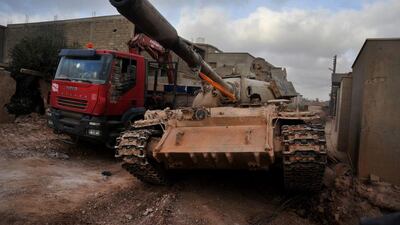The decision by world powers to loosen Libya’s arms embargo and better equip the new unity government to combat ISIL may cause more problems than it solves, not least by fuelling the country’s civil war.
Under the US and Italy-led initiative, agreed at a summit in Vienna on Monday, 21 states backed the Government of National Accord in asking the United Nations for an exemption from its arms embargo on the country.
But while ISIL continues to expand in Libya, also posing an increasing threat to neighbouring states, it is doing so amid a parallel civil war between rival governments at either end of the country.
The Tripoli based National Salvation Government’s militia coalition, named Libya Dawn, is battling forces of the rival House of Represetatives parliament in the eastern city of Tobruk.
The new, UN-backed, GNA arrived in the capital six weeks ago, but has failed to persuade the existing two governments to hand over authority. The GNA has no army of its own, relying on Libya Dawn militias for security in the capital and being shunned by Tobruk.
The GNA’s presidential council, which is responsible for naming ministers to the government, set up a military headquarters in Tripoli to combat ISIL, but has no units except the promise last week that it will set up a presidential guard.
GNA prime minister Fayez Al Sarraj made his arms appeal in Britain's Daily Telegraph newspaper this week, writing: "We are not asking for foreign boots on the ground, but we are requesting assistance with training, and lifting the arms embargo on Libya."
The embargo was first enacted in 2011 during the uprising against Muammar Qaddafi.
On Tuesday, the GNA’s deputy prime minister, Mussa Al Kony, said his government’s priority was to acquire “aircraft”.
“We want pilots, helicopters and warplanes,” he added.
The GNA was created as a unity government to end a nearly two-year civil war between the House of Representatives parliament in the eastern city of Tobruk and its rival National Salvation Government in Tripoli. Yet neither administration, nor their armed forces, have accepted the GNA.
The past month has seen the civil war escalate. Tobruk’s Operation Dignity forces, led by General Khalifa Haftar, have captured most of second city Benghazi from militants and swept west, taking the Sirte Basin, home to the country’s greatest concentration of oilfields.
Ostensibly, this offensive is aimed at ISIL whose main base is located at the coastal city of Sirte. But the main battle of the offensive, for the town of Zellah, has pitted Gen Haftar’s forces against Libya Dawn militias, who are allied to Tripoli’s National Salvation Government.
Libya Dawn — a coalition of militias — has also pledged to battle ISIL at Sirte, and is fighting now to recapture the strategically important town of Abu Grein, captured by the extremists last week.
But although the international community is preoccupied with the fight against ISIL, in Libya the focus remains on the struggle between the two administrations.
Tobruk timed the Sirte Basin offensive with a its own blockade of oil exports, complaining that revenues were passing to Tripoli.
The blockade appears over after tentative talks between the country’s rival state oil companies, but the Sirte Basin offensive marks a sharp escalation by Tobruk’s forces.
Off the battlefield, Tobruk’s central bank has also ordered its own currency, printed in Russia, after its Tripoli rival had its currency printed in Britain.This has further fuelled fears that the country is heading for a break-up, with the east holding the bulk of oil production.
This split is reflected in the international community. While all key powers signed-off on the idea of loosening the arms embargo, they remain divided over which administration they support. The US and European Union recognise the GNA, while Russia, Egypt and the UAE insist that — as per the GNA constitution — the unity government can only become the legitimate administration when the Tobruk parliament gives its approval. That parliament is now in chaos, however, with voting sessions continuously breaking up. As a result, the prospects of Tobruk approving the GNA are currently slight.
Into this combustible mix the UN is now planning to inject fresh weapons, relying on pledges from Mr Al Sarraj that they will only be turned on ISIL.
Doubts that this is possible were voiced last March by the UN panel of experts responsible for policing the arms embargo on Libya. The experts reported that tanks, planes and artillery requested by Tobruk — at the time recognised by the international community as Libya’s legitimate administration — might fuel the civil war.
Similar questions are being voiced now.
“The loosening of the UN arms embargo ... would probably serve to inject renewed energy into Libya’s civil war rather than galvanise its combatants into unified action against the Islamic State,” IHS Jane’s, a leading defence analyst, warned earlier this week.
“Three rival commands have been formed to coordinate the offensive (against ISIL), none of which is co-operating with each other.”
US secretary of state John Kerry admitted that the GNA’s request for exemption from the embargo would need to be “carefully sculpted”. But in practice, policing shipments to the GNA would be impossible, not least after outside states recently stepped back from plans to send 5,000 Italy-led troops to Libya to train a new army, loyal to the GNA.
Without an army of his own, Mr Al Sarraj will be forced to hand any new weapons to the country’s galaxy of militias, trusting they will turn them on ISIL and not each other.
foreign.desk@thenational.ae
* With additional reporting by Agence France-Presse

